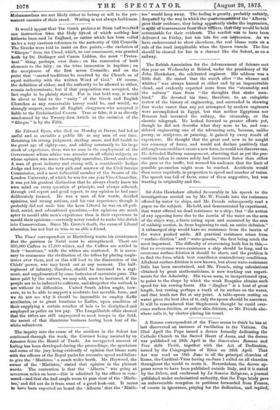The British Association for the Advancement of Science met this
year on Wednesday at Bristol, under the presidency of Sir John Hawkshaw, the celebrated engineer. His address was a little dull. He stated that- the search after "the whence and whither " was always barred at either end by an impenetrable cloud, and evidently expected more from the "steamship and the railway" than from "the thoughts that shake man- kind," He devoted his time, therefore, to an eulogistic review of the history of engineering, and succeeded in showing that works vaster than any yet attempted by modern engineers were accomplished in Egypt, but that neither Egyptians nor Romans had invented the railway, the steamship, or the electric telegraph. He looked forward to greater efforts yet, though he did not describe what they were to be, and con- sidered engineering one of the advancing arts, because, unlike poetry, or sculpture, or painting, it gained by every result of experience. He thought that the great end now to be sought was economy of force, and would not declare positively that although man could not create a new force, he could not discover one. He defended Railway management, observing that as yet the pre- cautions taken to ensure safety had increased faster than either the pace or the traffic, but warned his audience that the limit of possible precaution might soon be reached. Accidents would then occur regularly, in proportion to speed and number of trains. The speech was full of facts, some of them suggestive, but was wanting in originality and fire.






























 Previous page
Previous page